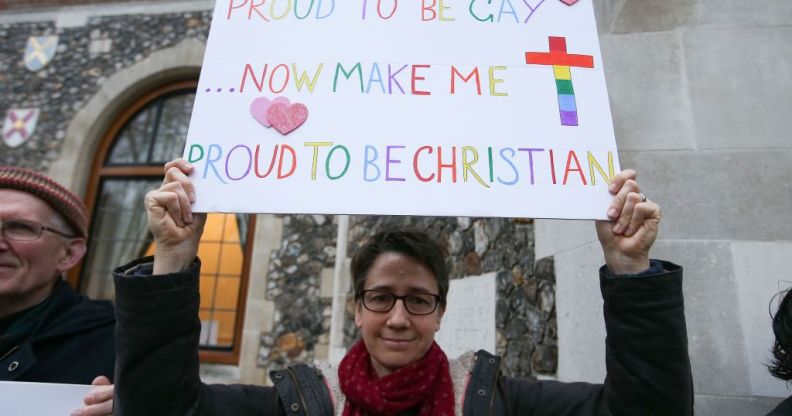Senior bishops join chorus of calls for Church of England to allow same-sex marriage

Demonstrators hold placards as they protest outside Church House, the venue of the Church of England’s General Synod, in 2017. (AFP/ Getty/ DANIEL LEAL-OLIVAS)
Bishops across the country have called for the Church of England to allow same-sex marriage, after the Bishop of Oxford became the highest ranking church official to do so.
On Friday (4 November), the right reverend Dr Steven Croft, Bishop of Oxford, published a powerful 52-page essay calling same-sex weddings to be allowed in Church of England churches, and for clergy to be allowed to enter into their own same-sex marriages.
Despite overwhelming support for LGBTQ+ inclusion among church members and the fact that the its Scottish counterpart, the Scottish Episcopal Church, has embraced marriage equality, the Church of England does not perform same-sex marriages.
It also refuses to bless same-sex civil unions, and although LGBTQ+ clergy members are allowed to be in same-sex relationships, they cannot marry and are forced to remain celibate to retain their positions.
In his essay, Croft acknowledged “the acute pain and distress of LGBTQ+ people in the life of the church”, and apologised that his “own views were slow to change”.
I've just been reduced to floods of uncontrollable tears..
At last a full heartfelt apology for the pain so many of us have gone through – the trauma runs very deep
I'm sorry you can't read all Bishop @Steven_Croft's paper free online but pls do read this from the Introduction! pic.twitter.com/vVxNEW8FXf
— Jayne Ozanne ???️⚧️ (@JayneOzanne) November 4, 2022
Following Croft’s essay, the bishops of Worcester, Dudley, Buckingham, Reading and Dorchester have all spoken out in support of same-sex marriage in the Church of England.
John Inge, Bishop of Worcester, and Martin Gorick, Bishop of Dudley, produced a joint open letter to clergy, in which they said that “the time has come for the church to celebrate and honour same sex relations”.
The Bishop of Dudley and I have written to all licensed clergy in the Diocese of Worcester as the ‘Living in Love and Faith’ process draws towards its conclusion. pic.twitter.com/6rGLsxaeyN— John Inge (@BishopWorcester) November 3, 2022
In 2020, after three years, the Church of England finally published its long-awaited resources titled Living in Love and Faith (LLF) on LGBTQ+ issues including “identity, sexuality, relationships and marriage”.
This month, the College of Bishops met to discuss the next steps in the process set out in LLF, although finalised proposals are not expected until the 2023 General Synod.
Inge and Gorick wrote: “The meeting was confidential, but we can say that, though there remains a divergence of views, we are all determined to continue to walk together… Up until now we have been asked, as bishops of the Church of England, to hold the LLF process of reflection, learning and discernment, rather than express our own views.
“That is exactly what we have tried to do, listening rather than talking. Now, though, in the interest of transparency, we think it is right for us to make our own beliefs and hopes plain.”
You re right, of course, and I stand convicted of being silent for too long in what, I persuaded myself, was the imperative of unity. I offer my apologies to all those who have been hurt. https://t.co/numGSDwgqz— John Inge (@BishopWorcester) November 4, 2022
Inge and Gorick were joined by Olivia Graham, Bishop of Reading, who tweeted her thanks to Croft for “publishing his contemplative, compassionate and courageous views on human sexuality and the Church”, adding: “I agree.”
Gavin Collins, Bishop of Dorcester, “endorsed” Croft’s “contemplative, compassionate and courageous call for the Church of England to support same-sex marriage”, and Alan Wilson, Bishop of Buckingham, described the essay as an “honest and godly view”.
Grateful to @Steven_Croft for publishing his contemplative, compassionate and courageous views on human sexuality and the Church. I agree.— Olivia Graham (@LiviJGraham) November 4, 2022
Very proud to serve under @Steven_Croft and to endorse his contemplative, compassionate and courageous call for the Church of England to support same-sex marriage.https://t.co/CBkTsFlX8O
— Gavin Collins (@GavinACollins) November 4, 2022
Many thanks and warm congratulations to @Steven_Croft
for articulating an honest and godly view https://t.co/cfcy3xqfnN— Alan Wilson (@alantlwilson) November 4, 2022
Jayne Ozanne, director of the Ozanne Foundation, told The Guardian: “It is really heartening to see a number of bishops now stepping forward and adding their voice to Croft’s calling for a church that seeks to honour and celebrate same-sex love.
“The silence has been deafening, and has only ever served to embolden conservatives whilst leaving LGBT+ people feeling angry and alone.”
But, as more and more senior figures make their feelings known on the topic of LGBTQ+ inclusion in the Church of England, the clearer the rift becomes between inclusive and “traditional” Anglicans.
At this year’s Lambeth Conference, a once-a-decade meeting of international Anglican churches convened by the Archbishop of Canterbury Justin Welby, a proposed resolution, or “draft call”, was put forward reaffirming the notorious Lambeth Resolution I:10.
The 1998 resolution saw bishops reject “homosexual practice as incompatible with scripture”, and more than 20 years on, the “Call on Human Dignity” reaffirmed I:10 and stated: “It is the mind of the Anglican Communion as a whole that same gender marriage is not permissible.”
After overwhelming backlash from churches, clergy and the LGBTQ+ community, the Anglican communion was later forced to amend the draft call, instead simply acknowledging the vast difference of opinion among churches, and committing “to listening and walking together to the maximum possible degree, despite our deep disagreement on these issues”.

